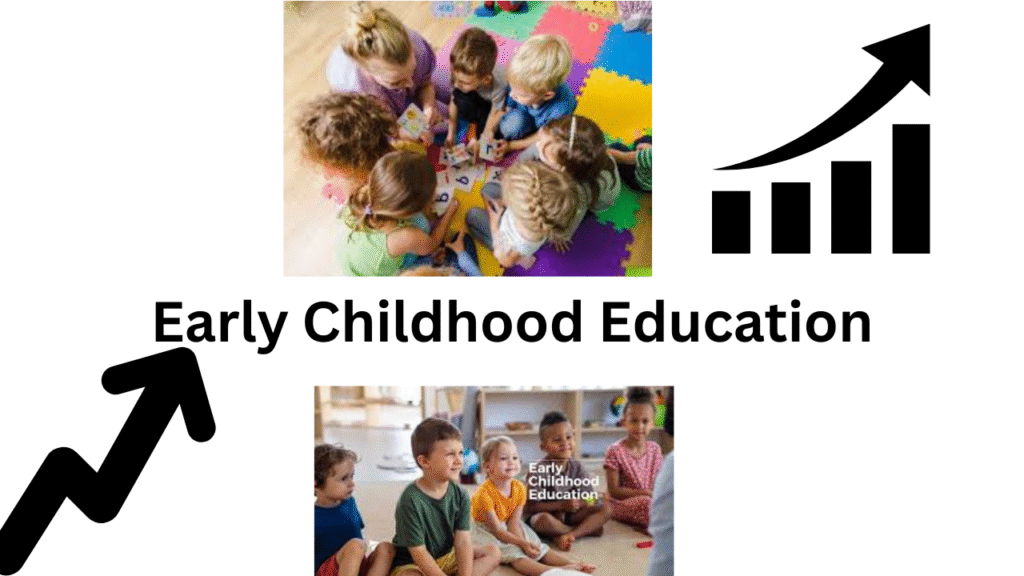
Introduction to Early Childhood Education
Early Childhood Education refers to the structured learning and care of children from birth to around eight years old. It focuses on nurturing cognitive, social, emotional, and physical development during the most critical stage of life. Early Childhood Education provides children with the foundation for future academic success. Through play-based learning, it encourages curiosity and creativity. This stage sets the direction for lifelong learning and growth.
Importance of Early Childhood Education in Child Development

Early Childhood Education is essential for overall child development. It helps in building strong communication skills, problem-solving abilities, and emotional balance. Studies show that children who receive quality Early Childhood Education perform better in academics later. It also fosters good behavior, discipline, and social interaction. Investing in Early Childhood Education ensures children are prepared for school and life challenges.
Historical Background of Early Childhood Education
The roots of Early Childhood Education date back to ancient times when play and storytelling were used to teach children. In the 19th century, pioneers like Friedrich Froebel introduced the kindergarten concept, emphasizing play-based learning. Later, educational theories by Piaget and Montessori shaped modern approaches. Over time, Early Childhood Education evolved into a formal discipline worldwide. Today, it is recognized as a key component of national education systems.
Key Principles of Early Childhood Education
The main principles of Early Childhood Education include inclusivity, play-based learning, and child-centered teaching. It emphasizes active participation, where children learn through exploration and discovery. Another principle is focusing on holistic development, covering physical, emotional, and intellectual growth. Respect for diversity and individual learning pace is also central. These principles make Early Childhood Education a flexible and effective approach.

Role of Teachers and Caregivers in Early Learning
Teachers and caregivers play a vital role in Early Childhood Education. They create nurturing environments that support curiosity and imagination. Teachers design activities that enhance literacy, numeracy, and social skills. Caregivers also provide emotional support, helping children feel safe and valued. Their patience and guidance foster positive behavior and confidence in young learners. In this way, they shape the foundation for lifelong learning.
Benefits of Early Childhood Education for Social and Emotional Growth
Early Childhood Education provides children with opportunities to develop social and emotional skills. Through group activities, they learn teamwork, sharing, and communication. It also teaches self-control, empathy, and problem-solving abilities. Children who experience Early Childhood Education show better adaptability in schools and communities. It lays the groundwork for emotional stability and healthy relationships throughout life.
Challenges in Early Childhood Education Systems

Despite its importance, Early Childhood Education faces challenges worldwide. Many schools lack trained teachers, proper resources, and modern teaching methods. High costs and limited access also prevent children from enrolling in early learning programs. Social inequalities and cultural barriers further restrict progress. Overcoming these challenges is necessary to make Early Childhood Education accessible to every child.
Use of Technology in Early Childhood Education
Technology has transformed Early Childhood Education by making learning interactive and engaging. Digital tools like educational apps, videos, and games support literacy and numeracy skills. Virtual classrooms and online platforms provide flexibility for parents and teachers. However, balanced screen time is crucial to avoid over-dependence. When used wisely, technology enhances the quality and reach of Early Childhood Education.
Government Policies and Global Support for Early Learning Programs
Governments worldwide are recognizing the importance of Early Childhood Education. Policies now focus on funding, training teachers, and expanding access. Global organizations like UNESCO and UNICEF support programs that promote early learning. These initiatives aim to reduce inequality and provide quality education for all children. Government support ensures that Early Childhood Education becomes a universal right rather than a privilege.
Conclusion: Building a Strong Foundation through Early Childhood Education
Early Childhood Education is the cornerstone of lifelong learning and development. It prepares children for academic success, emotional stability, and social adaptability. Teachers, parents, and governments must collaborate to strengthen early learning programs. With proper resources and strategies, it can transform future generations. Investing in Early Childhood Education means building a stronger, brighter, and more inclusive society.
FAQs
Q1: What is Early Childhood Education?
Early Childhood Education is structured learning for children from birth to around eight years old, focusing on overall development.
Q2: Why is Early Childhood Education important?
It builds a strong foundation for cognitive, social, and emotional growth, preparing children for academic success and lifelong learning.
Q3: What are the main principles of Early Childhood Education?
The key principles include play-based learning, child-centered teaching, inclusivity, and focus on holistic development.
Q4: How do teachers contribute to Early Childhood Education?
Teachers design activities, encourage curiosity, and provide a nurturing environment that supports early literacy, numeracy, and social skills.






Leave a Reply